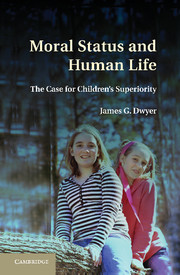Book contents
- Frontmatter
- Contents
- Introduction
- 1 What Is Moral Status and Why Does It Matter?
- 2 How Is Moral Status Determined?
- 3 Selecting Criteria of Moral Status
- 4 Problems in Applying a Multicriteria Approach
- 5 Applying a Multicriteria Moral Status Test to Adults and Children
- 6 Legal, Policy, and Moral Implications of Children's Superiority
- Conclusion
- Bibliography
- Index
4 - Problems in Applying a Multicriteria Approach
Published online by Cambridge University Press: 10 November 2010
- Frontmatter
- Contents
- Introduction
- 1 What Is Moral Status and Why Does It Matter?
- 2 How Is Moral Status Determined?
- 3 Selecting Criteria of Moral Status
- 4 Problems in Applying a Multicriteria Approach
- 5 Applying a Multicriteria Moral Status Test to Adults and Children
- 6 Legal, Policy, and Moral Implications of Children's Superiority
- Conclusion
- Bibliography
- Index
Summary
Additional, preliminary theoretical issues warrant consideration before attempting to analyze the relative moral status of humans at different stages of life. One alluded to previously is the concern that a metric for attributing moral status that allows for hierarchies within the category of humans, and that bases moral status in part on such things as degree of sentience or rationality, could justify discriminatory practices toward certain groups of people. The other is a concern that multiplying the criteria of moral status makes it impossible to apply a theory of moral status coherently or objectively, leaving us with either arbitrary, thoroughly subjective judgments or radical indeterminacy.
Before addressing these concerns, I will point out one important virtue of a multicriteria, sliding-scale view of moral status, in addition to just its consistency with our moral psychology. Such a view is much better able than any single-criterion view or any all-or-nothing view to explain many widespread specific convictions about the relative moral standing of different entities and about proper treatment of certain entities. In the human realm, it allows us to explain more satisfactorily why an embryo has some moral status but not necessarily the same as that of a normal, conscious, postbirth individual, so that we should treat an embryo with some respect but might justifiably give priority to the life of a pregnant woman over that of an embryo in her womb.
- Type
- Chapter
- Information
- Moral Status and Human LifeThe Case for Children's Superiority, pp. 131 - 144Publisher: Cambridge University PressPrint publication year: 2010



